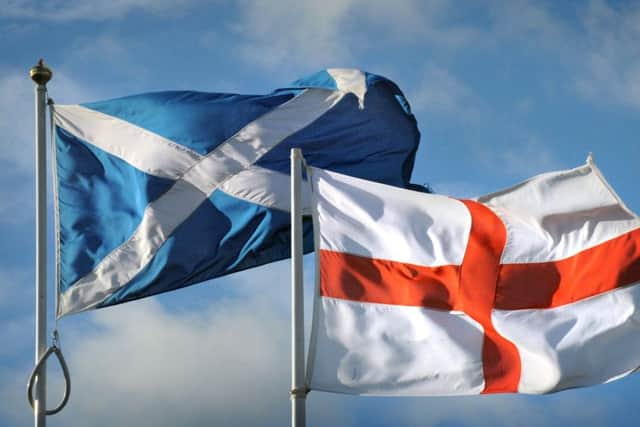Tom Peterkin: The English Tories who care more about Brexit than Union
For those concerned about the impact of Brexit on Britishness, there was some dispiriting research published by Edinburgh and Cardiff universities this week. Surveys conducted with thousands of adults across the Scotland, England, Wales and Northern Ireland found what was described as “mutual indifference” towards the Union that ties those countries together.
Apparently a comfortable majority of English Conservatives would support Scottish independence (79 per cent) or the collapse of the Northern Irish Peace Process (75 per cent) as the price of Brexit.
Advertisement
Hide AdAdvertisement
Hide AdMoreover, 87 per cent of Leave voters in Northern Ireland see the collapse of the peace process as an acceptable price for Brexit.


Still in Northern Ireland, 86 per cent of Leave voters say that a Yes vote in a second Scottish independence referendum is an acceptable price for EU withdrawal. Given that Leave voters in Northern Ireland are overwhelmingly of Unionist persuasion, these findings make one wonder quite what kind of Union it is that they actually believe in.
As one of the academics behind the study – Professor Ailsa Henderson of Edinburgh University – put it: “There is evidence that Brexit is dislodging long-held red lines about the Union. If even Unionists in Northern Ireland care less about the territorial integrity of the UK than pursuing Brexit, then it really raises questions about the type of Union we’re in, and indeed what Unionism means.”
But perhaps it is the attitude of English Conservatives, who appear to regard Scottish independence as tolerable collateral damage, that should be of most concern to those in Scotland who cherish what Theresa May has described as “our precious Union”.
The figureheads of this strand of thought are the likes of Boris Johnson and Jacob Rees-Mogg, who may pay lip service to the Union but whose pursuit of a hard Brexit appears to pay scant regard to the UK at large.
The lax attitude towards the Union displayed by Brexiteers south of the border taking part in the study is also reflected in the views of a considerable and influential number of Conservative MPs. These English Conservatives are a different species to Tories north of the border whose belief in the integrity of the United Kingdom is absolutely fundamental to their politics.
There is anxiety amongst Scottish Tories that Brexit is creating a dynamic whereby English Nationalism trumps British Unionism. That’s exactly why Scottish Conservative leader Ruth Davidson made such an impassioned plea for the Union in front of her fellow Tory politicians and the party rank-and-file at the recent UK conference in Birmingham.
“Let’s never lose sight of the fact that the Union that’s most important to us is our own: the Union of Scotland, England, Wales and Northern Ireland,” Ms Davidson implored conference.
Advertisement
Hide AdAdvertisement
Hide AdScottish Conservatives can take some comfort that the Prime Minister at least appears to be sympathetic to their concerns. They point to the short speech she made outside Downing Street two years ago when taking over from David Cameron.
“Not everybody knows this, but the full title of my party is the Conservative and Unionist Party,” ssid Mrs May, giving a reminder that was more pertinent to her colleagues south of the border than those north of it.
Of recent UK Tory leaders, Mr Cameron also had an acute sense of the importance of the Union, perhaps as a result of his own Scottish ancestry. But he is no more, having dashed his political career on the rocks of the Leave vote in 2016. And who’s to say that Tory divisions over Europe won’t also account for Mrs May?
The ties that bind the UK together are looser than of old. The rise of the SNP, the independence referendum of 2014 and now Brexit have contributed to that. There are also more nebulous factors at play. The Second World War may still be in living memory (just), but the sense of common endeavour that defined Britain in its darkest hour is not as strong as it was a couple of generations ago. The trade unions with their ethos of solidarity across the UK are not the force they once were. With the death of a Queen Mother from Angus in 2002, the Royal Family lost a symbolic link with Scotland. Amalgamations and a reduced military footprint mean that the Highland Regiments do not offer the same sort of distinctive Scottish identity within the British Army as they once did. And the BBC, once an important expression of Britishness, has been scapegoated by political movements for its coverage of the two referenda.
Therefore Ms Davidson’s attempts to protect the Union over the next few months and years are not without challenges, especially when faced with an SNP desperate to exploit the chaos of Brexit and the prospect of Remain-voting Scots converting to the independence cause in dismay over the way things are going.
More encouragingly from her point of view, the 2014 referendum and subsequent polls shows that there is still sizeable support for the UK in Scotland – particularly when it comes to the economic benefits of the Union. So expect more arguments from the Scottish Tories that the economic consequences of exiting one political union (the EU) cannot be mitigated by breaking up another (the UK). Meanwhile – behind the scenes – Ms Davidson will urge her southern colleagues to stop playing fast and loose with the United Kingdom.
